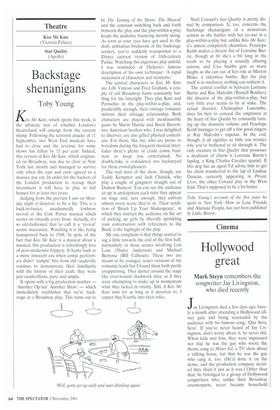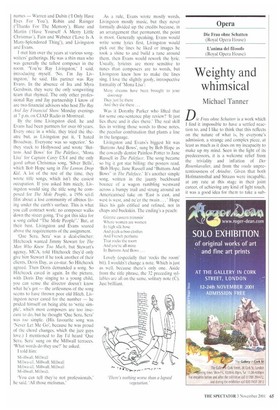Cinema
Hollywood great
Mark Steyn remembers the songwriter Jay Livingston, who died recently
Jay Livingston died a few days ago, barely a month after attending a Hollywood allstar gala and being serenaded by the audience with his famous song, `Que Sera, Sera'. If you've never heard of Jay Livingston, don't worry about it, he never did. When kids met him, they were impressed not that he was the guy who wrote the theme song to Mister Ed, a TV show about a talking horse, but that he was the guy who sang it, too. (He'd done it on the demo, and the production company decided they liked it just as it was.) Other than that, he belonged to a group of Hollywood songwriters who, unlike their Broadway counterparts, never became household
names — Warren and Dubin ('I Only Have Eyes For You'), Robin and Rainger ('Thanks For The Memory'), Blanc and Martin ('Have Yourself A Merry Little Christmas'), Fain and Webster Move Is A Many-Splendored Thing'), and Livingston and Evans.
I met him over the years at various songwriters' gatherings. He was a thin man who was generally the tallest composer in the room. 'You're Ray Livingston,' I said, introducing myself. 'No, I'm Jay Livingston,' he said. His partner was Ray Evans. In the absence of Ira and Myra Gershwin. they were the only songwriting team that rhymed. The only other professional Ray and Jay partnership I know of are two financial advisors who host The Ray And Jay Financial Show Monday evenings at 7 p.m. on CJAD Radio in Montreal, By the time Livingston died, he and Evans had been partners for over 60 years. Every once in a while, they tried the theatre but, as Livingston put it, `I hated Broadway. Everyone was so superior.' So they stuck to Hollywood and wrote 'Buttons And Bows' for The Paleface, 'Mona Lisa' for Captain Carey USA and the only good urban Christmas song, 'Silver Bells', which Bob Hope sang in The Lemon Drop Kid. A lot of the rest of the time, they wrote title songs, which isn't the easiest occupation. If you asked him nicely, Livingston would sing the title song he composed for The Mole People, a 1956 sci-fi film about a lost community of albinos living under the earth's surface, This is what you call contract work: no composer walks down the street going, 'I've got this idea for a song called "The Mole People".' But, at their best. Livingston and Evans soared above the requirements of the assignment.
'Que Sera, Sera' was a deal-clincher: Hitchcock wanted Jimmy Stewart for The Man Who Knew Too Much, but Stewart's agency, MCA, told Hitchcock they'd only give him Stewart if he took another of their clients, Doris Day, as co-star. So Hitchcock agreed. Then Doris demanded a song. So Hitchcock caved in again. In the picture, with Doris Day singing to a young child, you can sense the director doesn't know what he's got — the artlessness of the song seems to have thrown poor old Hitch. Livingston never cared for the number — he prided himself on being able to 'write simple', which most composers are too insecure to do. but he thought `Que Sera, Sera' was too simple. (His favourite song was Never Let Me Go', because he was proud of the chord changes, which the jazz guys love.) I mentioned to Jay I'd heard 'Que Sera. Sera' sung on the Millwall terraces. 'What words do they use? he asked.
I told him:
Mi-illwall. Millwall Millwa-all. Millwall, Millwall Millwa-all. Millwall. 141illwall Mi-illwall. Miltwill].
You can tell they're not professionals,' he said. 'All those melismas.' As a rule, Evans wrote mostly words, Livingston mostly music, but they never formally divided up the credits because, in an arrangement that permanent, the point is moot. Generally speaking, Evans would write some lyrics first, Livingston would pick out the lines he liked or images he took a shine to and build a tune around them, then Evans would rework the lyric. Usually, lyricists are more sensitive to tunes than composers are to words, but Livingston knew how to make the lines sing. I love the slightly goofy, introspective formality of 'Mona Lisa':
Many dreams have been brought to your doorstep They just lie there And they die there .. .
Was it Dorothy Parker who lifted that for some one-sentence play review? It just lies there and it dies there.' The real skill lies in writing those words to those notes, the peculiar combination that plants a line in the language.
Livingston and Evans's biggest hit was 'Buttons And Bows', sung by Bob Hope as the cowardly dentist Painless Potter to Jane Russell in The Paleface. The song became so big it got star billing: the posters read, 'Bob Hope, Jane Russell and "Buttons And Bows" in The Paleface.' It's another simple song, written in the jaunty buckboard bounce of a wagon rumbling westward across a bumpy trail and strung around an Americanised take on 'East is east, and
west is west, and ne'er the twain ' Hope likes his gals citified and refined, not in chaps and buckskin. The ending's a peach:
Gimme eastern trimmin' Where women arc women In high silk hose
And peck-a-boo clothes And French perfume That rocks the room And vou're all mine In Buttons And Bow's..
Lovely (especially that 'rocks the room' bit). I wouldn't change a note. Which is just as well, because there's only one, Aside from the title phrase, the 32 preceding syllables are all on the same, solitary note (C). Just brilliant.



















































































 Previous page
Previous page